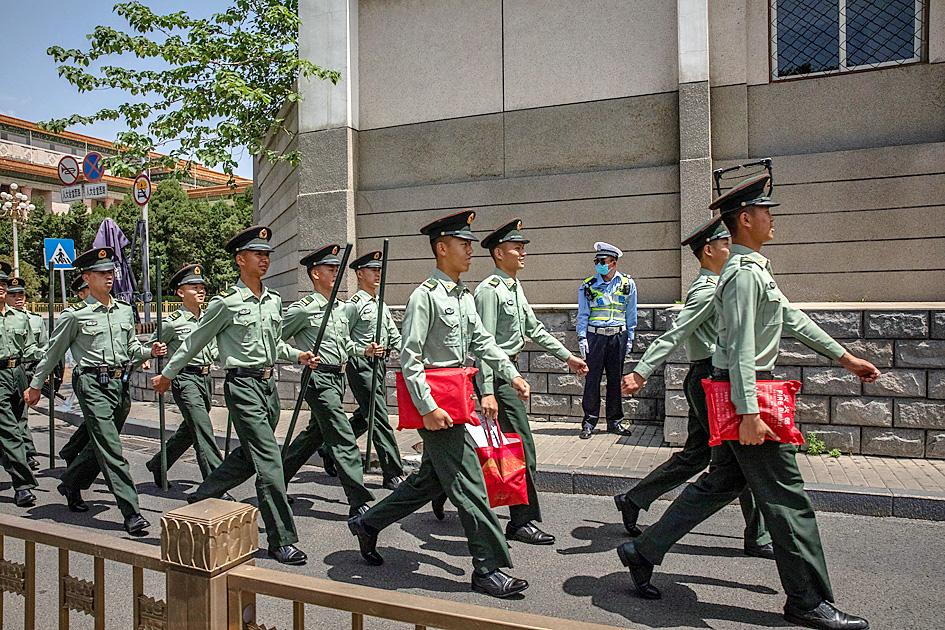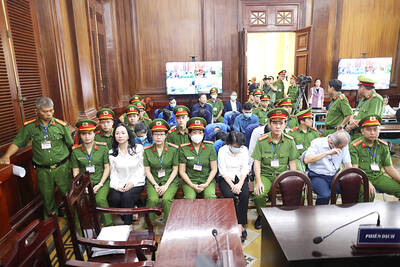China, facing what it sees as increasing military pressure from the US, is likely to shrug off the pall hanging over its economy from the COVID-19 pandemic and increase its defense budget again this year.
China’s military spending, due to be announced when the annual meeting of the National People’s Congress finally opens on Friday, is closely watched as a barometer of how aggressively it will beef up its military capabilities.
China set a 7.5 percent rise for the defense budget last year, outpacing what ended up as full-year GDP growth of 6.1 percent in the world’s second-largest economy.

Photo: EPA-EFE
Its economy shrank 6.8 percent in the first quarter of this year from a year earlier, as the novel coronavirus spread from Wuhan, and the government has said economic conditions remain challenging.
Despite the pandemic, the armed forces of China and the US have remained active in the disputed South China Sea and around Taiwan.
Xie Yue (謝岳), a professor of political science at Shanghai’s Jiao Tong University and a security expert, said that while it is hard to predict if the defense budget would grow at a higher or lower rate than last year, it would definitely rise.
“From the national security point of view, China needs to appear strong to the West, especially the United States, which has been putting more pressure on China on all fronts, including militarily,” he said.
The pandemic has worsened already poor ties between Beijing and Washington, with accusations from US President Donald Trump’s administration of a Chinese cover-up and delayed release of information about the outbreak.
The Chinese Ministry of State Security warned in a recent internal report that China faced a rising wave of hostility in the wake of the outbreak that could tip relations with the US into armed confrontation.
The Chinese Ministry of National Defense did not respond to a request for comment.
China reports only a raw figure for military expenditure, with no breakdown. It is widely believed by diplomats and foreign experts to under-report the real number.
Taking the reported figure at face value, China’s defense budget last year — 1.19 trillion yuan (US$167.52 billion) — was about a quarter of the US defense budget last year, which stood at US$686 billion.
Global Times editor-in-chief Hu Xijin (胡錫進) yesterday wrote in a WeChat post that he anticipated the defense budget would rise.
“China needs more military power as a deterrent, to ensure the US will not act on its impulses because of unbearable costs,” Hu said.
Experts point out that the benefit of increasing defense spending when the economy is weak is that it can give the economy a much-needed shot in the arm, with manufacturing struggling and domestic consumption slack over worries about job security.
China’s defense spending last year represented slightly more than 5 percent of total government expenditure and about 1.2 percent of GDP for the year.
Xie said investing in home-grown military technology research and development would be money well-spent, as tightening sanctions meant it was increasingly hard for China to buy technology on the global market.
“With nationalist sentiment running high, not only will the increase in military expenditure not be criticized too much, it may even lead to citizens feeling more pride in the country,” he said.

Republican US lawmakers on Friday criticized US President Joe Biden’s administration after sanctioned Chinese telecoms equipment giant Huawei unveiled a laptop this week powered by an Intel artificial intelligence (AI) chip. The US placed Huawei on a trade restriction list in 2019 for contravening Iran sanctions, part of a broader effort to hobble Beijing’s technological advances. Placement on the list means the company’s suppliers have to seek a special, difficult-to-obtain license before shipping to it. One such license, issued by then-US president Donald Trump’s administration, has allowed Intel to ship central processors to Huawei for use in laptops since 2020. China hardliners

A top Vietnamese property tycoon was on Thursday sentenced to death in one of the biggest corruption cases in history, with an estimated US$27 billion in damages. A panel of three hand-picked jurors and two judges rejected all defense arguments by Truong My Lan, chair of major developer Van Thinh Phat, who was found guilty of swindling cash from Saigon Commercial Bank (SCB) over a decade. “The defendant’s actions ... eroded people’s trust in the leadership of the [Communist] Party and state,” read the verdict at the trial in Ho Chi Minh City. After the five-week trial, 85 others were also sentenced on

Conjoined twins Lori and George Schappell, who pursued separate careers, interests and relationships during lives that defied medical expectations, died this month in Pennsylvania, funeral home officials said. They were 62. The twins, listed by Guinness World Records as the oldest living conjoined twins, died on April 7 at the Hospital of the University of Pennsylvania, obituaries posted by Leibensperger Funeral Homes of Hamburg said. The cause of death was not detailed. “When we were born, the doctors didn’t think we’d make 30, but we proved them wrong,” Lori said in an interview when they turned 50, the Philadelphia Inquirer reported. The

RAMPAGE: A Palestinian man was left dead after dozens of Israeli settlers searching for a missing 14-year-old boy stormed a village in the Israeli-occupied West Bank US President Joe Biden on Friday said he expected Iran to attack Israel “sooner, rather than later” and warned Tehran not to proceed. Asked by reporters about his message to Iran, Biden simply said: “Don’t,” underscoring Washington’s commitment to defend Israel. “We are devoted to the defense of Israel. We will support Israel. We will help defend Israel and Iran will not succeed,” he said. Biden said he would not divulge secure information, but said his expectation was that an attack could come “sooner, rather than later.” Israel braced on Friday for an attack by Iran or its proxies as warnings grew of